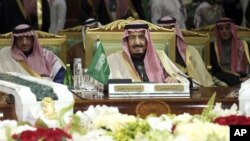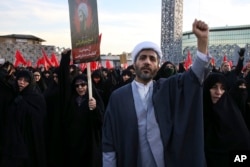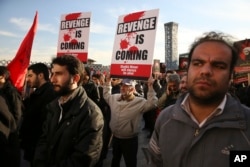Iran isn’t alone in issuing dire threats against Saudi Arabia — the Islamic State has ratcheted up a propaganda campaign against the Gulf kingdom’s ruling family, denouncing them for siding with the U.S.-led coalition against the jihadists and urging followers to oust them.
“The Islamic State has exerted much effort in the last couple of weeks to attacking Saudi Arabia in an extensive and well-coordinated media campaign,” says Marwan Khayat, an analyst at the Middle East Media Research Institute (MEMRI), a Washington-based group that monitors jihadist propaganda.
In an outpouring of videos and social media postings that increased noticeably in tempo more than two weeks ago, the terrorist army’s propagandists have been exhorting the kingdom’s Sunni Muslims to target the ruling House of Saud as well as the Wahhabi religious establishment and the Saudi military underpinning the royal family.
Ironically, in light of Iran’s fury over the execution at the weekend of an influential Shi’ite cleric, one of the Islamic State’s chief charges against the Saudi royals is that they have allowed the kingdom’s Shi'ite Muslims - considered apostates by IS - a free hand to live and practice their religion in the country.
'Divine vengeance'
Following Saudi Arabia's executions of four Shi'ite Muslims Saturday, Iran threatened “divine vengeance." Most international attention since has focused on the conflict between Saudi Arabia and Iran. But 43 Sunni jihadists were among the executed prisoners and since their slayings IS has pledged to target the al-Ha’ir and Tarifya prisons, two facilities where al-Qaida and IS suspects are being held.
But even before the executions, IS had upped its propaganda threats against the Saudi royal family.
In one video from Iraq’s al-Anbar province, an IS member called Abu Khalid al-Jazrawi denounces the presence of Shi'ites in Saudi Arabia and laments what he called the failure of the Saudi government to fully implement Sharia law.
In the same 15-minute video, another IS member, Abu 'Azzam al-Jazrawi, accuses the kingdom’s religious scholars of hypocrisy. He calls on IS supporters in Saudi Arabia, including those seeking martyrdom, to target "the enemies of Allah,” saying, "they are among you and on your streets. There is no easier way to kill them and there is nothing more delicious than spilling their blood.”
This isn’t the first time Islamic State propagandists have targeted the Saudi royal family. Like al-Qaida, the jihadist group IS spun off from, IS views Saudi princes and other Gulf ruling families as much the enemy as the West — this despite the fact that they have aided ultraconservative Salafist militias and groups in the region, including the Army of Conquest, a rebel alliance in Syria which boasts al-Qaida affiliate Jabhat al-Nusra as a dominant member.
In May 2015, IS leader Abu Bakr al-Baghdadi condemned the House of Saud for collaborating with the West. He claimed the Islamic State group is the only genuine protector of Sunnis.
And in December, al-Baghdadi denounced a new Saudi-led Islamic military alliance of 34 countries created to “coordinate and support military operations to fight terrorism.” Since then, the output of anti-Saudi propaganda has increased.
Anti-Saudi videos
According to MEMRI’s Khayat, IS's various arms have posted 15 official anti-Saudi videos, ranging in length from five minutes to over half-an-hour. There has been similar “prolific content released from the IS-affiliated al-Battar media company over social networks and jihadi forums,” he adds.
Al-Battar has issued two anti-Saudi videos, eight articles, and 50 posters.
“The campaign's organization and presentation carried several of the hallmarks which by now have become a staple of ISIS's online operations, including volume, coordination, and persistence. IS relies on volume, in which the same message, or variants of, are presented repeatedly to a given audience, to make an impact,” Khayat says.
And the uptick in rhetoric may presage more violence on the ground.
“IS propaganda has been consistent in that it has inspired members and lone-wolf types to attack targets specified by the group,” says Jonathan Schanzer, an analyst with the Foundation for the Defense of Democracies, a think tank. With the population already indoctrinated with hardline Wahhabi ideology, Saudi Arabia remains “fertile ground for recruitment,” he says.
“The Saudis have branded IS as a terror group and it has been part of the U.S.-led bombing campaign against the group in Syria and Iraq. Indeed, the Saudis are the leaders among the Arab countries in this campaign,” says Schanzer.
An IS supporter blew himself up outside Ha’ir prison near the Saudi capital in July. And IS itself claimed responsibility for a string of bombing and shooting attacks since November 2014 in which more than 50 people lost their lives, most of them Shi’ites.






